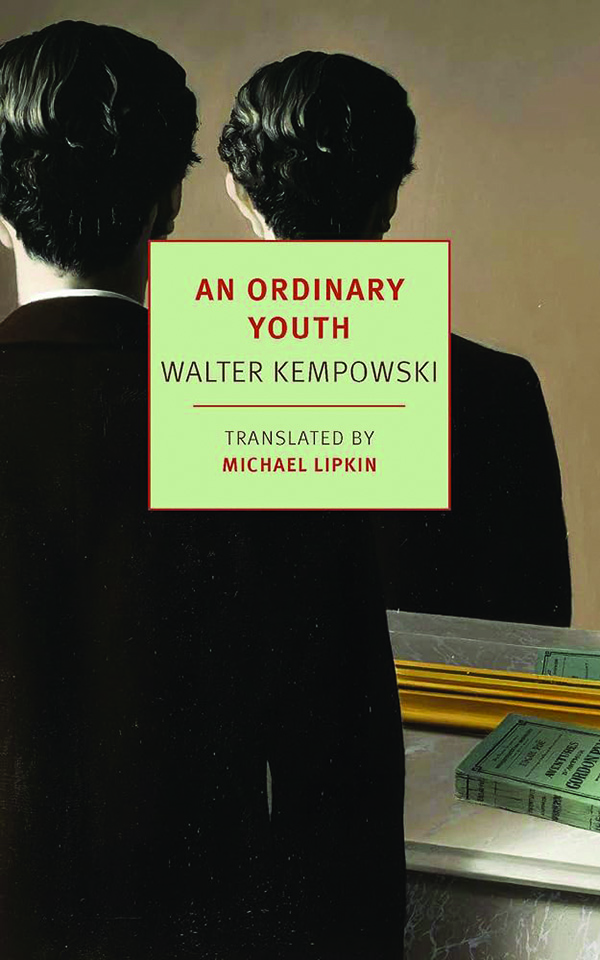
A youth in Nazi Germany
Malcolm Forbes
For years, Walter Kempowski (1929-2007), one of Germany’s most popular and most celebrated writers from the second half of the 20th century, was an unknown quantity in the English-speaking world. Only recently has he begun to register on Anglophone readers’ radars, thanks to the publication of a couple of his works in translation. Those books delve into the past and examine the impact of World War II on Germans — how the brutality and futility of the conflict inflicted personal pain and engendered collective guilt.

As a novelist, Kempowski traversed similar terrain to that of his postwar peers. Like Heinrich Böll, he grappled with Vergangenheitsbewältigung, an attempt to reckon with and overcome the past, specifically the horror of the Third Reich. (In The Periodic Table, Primo Levi reveals that this German term is in fact a euphemism for “redemption from Nazism.”) Like Günter Grass, who explored the sinking of a German ship by a Soviet submarine in his 2002 novel Crabwalk, Kempowski regularly flouted a hitherto taboo idea and showed Germans as victims. And like W.G. Sebald, Kempowski blurred fact and fiction to probe and make sense of memory, loss, and wartime destruction.
THE BAD IDEA ABOUT LANGUAGE THAT RESEARCH KEEPS FALSIFYING
In Marrow and Bone, published in Germany in 1991, Kempowski follows a West Berlin-based journalist who, after venturing behind the Iron Curtain to report on a car rally in Poland, finds himself confronting his family history in the place where he was born at the bitter end of the war. In Kempowski’s last novel, All for Nothing (2006), which also plays out in the final throes of the war, an East Prussian family comes undone as the world around them disintegrates and the Red Army homes in.
But Kempowski’s singular achievement was not a novel but rather a ten-volume series of books made up of letters, speeches, diary extracts, and eyewitness accounts chronicling different episodes of the war years. Kempowski described his Echo Soundings project as “rescuing the voices of the dead.” Those voices are particularly resonant in the concluding installment, Swansong 1945, which appeared in English in 2014. Comprising contributions from soldiers, nurses, politicians, war reporters, housewives, concentration camp inmates, and an increasingly deluded Goebbels on the radio and Hitler in the Führerbunker, Kempowski’s self-proclaimed “collage” of testimonies makes for a compelling tableau that highlights the fear, confusion, despair, and burgeoning hope that pervaded nations at the end of hostilities.
Kempowski’s latest work to be translated into English is the book he had his first success with in his native country in 1971 and the one for which he is still best known. An Ordinary Youth is a novelization of the author’s early years in the north of Germany. Kempowski chronicles a childhood that was largely frictionless and trouble free — that is until gathering storm clouds and falling bombs forced him to grow up fast.
The book opens with the prosperous Kempowski family moving into a new apartment in the Baltic city of Rostock. Young Walter, our narrator, is a happy-go-lucky 9-year-old boy. He plays with toy soldiers, forms a close bond with his neighbor Ute, and puts on plays with his friend Manfred. Some days are beach days with his older siblings Ulla and Robert. He goes to the movies to watch Laurel and Hardy and listens to his brother’s well-worn jazz records.
So far so normal. But then Walter starts to stud his narrative with pertinent signs of the times: a family photograph with his shipping-agent father resplendent in the uniform of the SA, the Nazis’ paramilitary wing; a picture of Hitler hanging on the wall of his father’s office; a granite swastika installed above the main entrance to the central station; a notice in a cafe stating “JEWS NOT WELCOME.” On their walk to secondary school, Manfred shows Walter a burnt-out synagogue with a broken Star of David on the gate and tells him that Jews murdered and dismembered Christians in the cellar.
During a particularly stressful family vacation, Walter’s mother announces that “the situation with Poland doesn’t sound good.” Shortly afterward, Germany is plunged into a war of its own making. It is good news for Walter’s teacher who considers war “glorious,” and no hardship for Walter’s father who believes it will all be over quickly: “Old Hitler has a good head on his shoulders.” But Walter’s mother is more critical: “Human beings can’t live in peace,” she complains. “The people at the top should get into a boxing ring and hash it out between themselves.”
Walter takes stock of a new reality involving blackouts, bomb shelters, and a ban on foreign words. He keeps calm and carries on, enduring more pressing ordeals such as a bout of scarlet fever and piano lessons with a terrifying teacher who reduces him to tears. Years pass, and on several occasions he experiences different surroundings: at one point his family is relocated. Later, he enjoys peaceful sojourns at his grandfather’s big house in Hamburg and on a friend’s country estate in Brandenburg. His family’s dynamic is altered when his sister marries a Dane and his father gets his wish and joins the war effort. Walter looks set to follow in his footsteps when, at the age of only 15, he receives a conscription order.
An Ordinary Youth has much to commend it. However, despite being the book that kick-started Kempowski’s career, newcomers to the writer’s work would do well to find another entry point. As this book’s central theme is coming-of-age rather than coming to terms with the past, in it we don’t find Kempowski playing to his considerable strengths. Furthermore, like the autofiction of Karl Ove Knausgaard, Kempowski’s autobiographical novel is packed, at times clogged, with quotidian minutiae. At the best moments, the narrative sparkles and zips along. At the worst ones, it sags and groans under the weight of longueurs and assiduously accrued detail.
Fortunately, Kempowski impresses far more often than he disappoints. His bourgeois family is brilliantly depicted, not least when snobberies rise to the surface: “My siblings were allowed to join the yacht club,” he reveals. “They didn’t want to join the rowing club; they weren’t galley slaves, after all.” His mother and father figures loom large on the page: she plagued by worry and uncertainty until the time comes to be resilient; he a stiff and starchy patriarch who expects obedience and punctuality — and a toilet seat that isn’t warm.
Walter’s child’s-eye view of life in the Third Reich constitutes captivating reading. He watches as his parents increasingly distance themselves from the Nazis and the terror they have unleashed, while also noting those who still pledge allegiance. As one man tells Walter’s mother: “This war — though a painful process — is washing clean all that was bad.”
Translator Michael Lipkin expertly renders the characters’ idiomatic speech, together with the novel’s wide range of interpolated texts – signs, slogans, songs, advertisements, poems, newspaper articles, and children’s rhymes. This is a colorful, impressionistic novel. If the varied hues and textures don’t always conceal the flaws, they still manage to create a vivid portrait of an ordinary boyhood at an extraordinary time.
CLICK HERE TO READ MORE FROM THE WASHINGTON EXAMINER
Malcolm Forbes has written for the Economist, the Wall Street Journal, and the Washington Post. He lives in Edinburgh.
